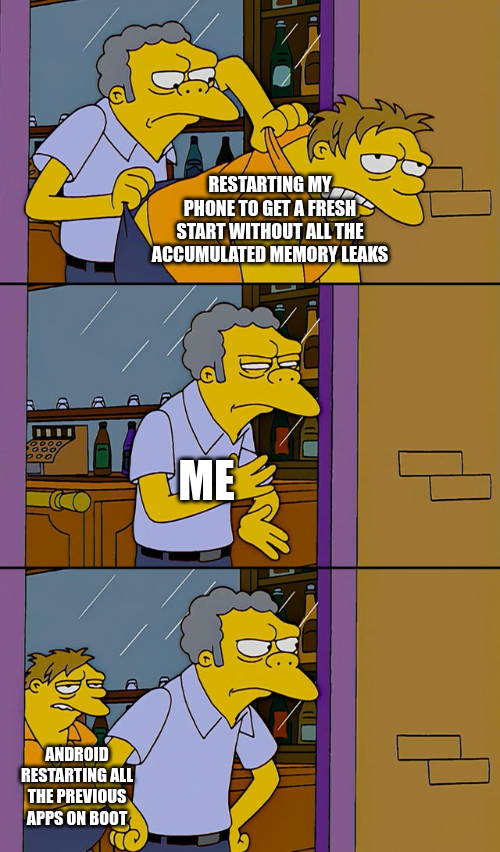Exactly. We certainly didn't after the LAST one.
mycodesucks
Yes, which is intentionally being stonewalled by manufacturers who enjoy being able to force their old models into obsolescence at their whim. There are only a handful of market players with essentially a stranglehold on the market, and they could EASILY coordinate on a set of standards that SoC developers need to conform to to be considered for product launches if we didn't live in a corporate driven techno-dystopia.
This again?????
DECOUPLE THE OPERATING SYSTEM FROM THE HARDWARE THE WAY PCS HAVE ALWAYS BEEN SO THEY CAN BE UPGRADED IN PERPETUITY UNTIL THE HARDWARE ISN'T POWERFUL ENOUGH ANYMORE.
"Your honor, rather than pay his outstanding debts, this shiftless f***wit used 75 million dollars to fund a SuperPAC to bother people at their homes for the benefit of the Trump campaign."
Absolutely. It's sucked a lot longer than that.
Edit: Sorry! I misread your comment at first. Yeah, now that you say that, that makes the most sense.
But from the standpoint of anti-competitivity and Android vs iOS with Apple...
One's behavior is denying access to their app store without agreeing to a set of device restrictions, but everything on the app store is available without the app store at developer discretion.
The other is an app store which MUST be installed, and is in fact the ONLY way to get software for the device.
One is CLEARLY more anti-competitive than the other, and yet the one that's LESS problematic is the one that gets court action. It's a joke.
https://source.android.com/license
https://en.wikipedia.org/wiki/Android_(operating_system)
"At its core, the operating system is known as the Android Open Source Project (AOSP)[5] and is free and open-source software (FOSS) primarily licensed under the Apache License. However, most devices run on the proprietary Android version developed by Google, which ships with additional proprietary closed-source software pre-installed,[6] most notably Google Mobile Services (GMS),[7] which includes core apps such as Google Chrome, the digital distribution platform Google Play, and the associated Google Play Services development platform. Firebase Cloud Messaging is used for push notifications. While AOSP is free, the "Android" name and logo are trademarks of Google, which imposes standards to restrict the use of Android branding by "uncertified" devices outside their ecosystem.[8][9]"
Android itself DOES NOT require ANY concessions of ANY kind to Google.
Android itself DOES NOT require ANY concessions of ANY kind to Google. Maybe "opening the app store" means making Google's services available without requiring those concessions to Google, in which case, that both makes sense and is a great idea.
This is the clearest and most sensible explanation of the situation, but I'm still not sure what's meant by "opening the app store". The reality is apps can be sideloaded and distributed freely on Android, even unrooted. Sure, Google requires OEMs to push Google services and tracking, and that's evil and horrible and nasty, but do they actually force that onto app developers as well?
That's not actually true though.
Android is open source and many devices, mostly Chinese products, launch with custom Android builds completely free of Google services. This is not a Google constraint - manufacturers CHOOSE to use Android builds that use Google's services. Creating your own build simply stops you from integrating Google's services into the OS, which is actually a PLUS if you ask me.
Even if they WERE requiring it, that would have nothing to do with end user store front installation, which is already something you can do, as shown by the 2 non-Google app stores I have installed on my phone.
Again... I'm not defending Google as some kind of good company here. I'm simply stating there is no way to make an anti-competitivity argument against Google in mobile that doesn't apply at least as much to Apple. This is a nonsensical double-standard.





But first he will accidentally the whole thing.